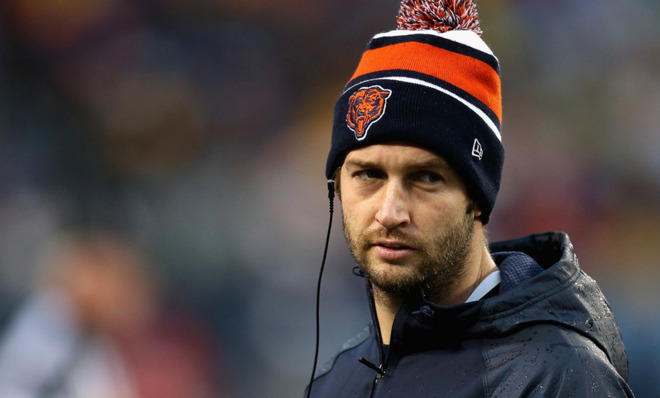Why Jay Cutler's big contract extension isn't as impressive as it sounds
Theoretically, the Chicago Bears could have offered him a billion dollar contract and paid him almost none of it


A free daily email with the biggest news stories of the day – and the best features from TheWeek.com
You are now subscribed
Your newsletter sign-up was successful
Jay Cutler and the Chicago Bears have reportedly agreed to a seven-year, $126 million contract that you would think is absolutely laughable, judging from the reaction of many sportswriters and Twitter.
And it is laughable, but not for the reason you'd expect.
The main gripe about the deal is that it's too big for a middling, unexciting quarterback, so it will look terrible come year seven. Leaving aside the fact that Cutler has actually been one of the better passers in an increasingly pass-happy league, the contract isn't destined to be a bust by its seventh year simply because there probably won't be a seventh year.
The Week
Escape your echo chamber. Get the facts behind the news, plus analysis from multiple perspectives.

Sign up for The Week's Free Newsletters
From our morning news briefing to a weekly Good News Newsletter, get the best of The Week delivered directly to your inbox.
From our morning news briefing to a weekly Good News Newsletter, get the best of The Week delivered directly to your inbox.
There may not even be a fourth.
Unlike the contracts in other major pro sports, those in the NFL don't guarantee players their full price nor duration. Rather, they contain a chunk of guaranteed money, plus salaries for given seasons should players remain with the team for those seasons. Teams can release players at will, and pocket whatever non-guaranteed money that has yet to be paid out.
As a result, teams sometimes write huge contracts that are deliberately back-loaded. These deals "allow the player to feel good about signing what sounds like an especially lucrative deal," ESPN's Mike Sando explained last year, even though teams "often avoid paying those inflated salaries by releasing the player before the money is due."
Teams in other pro sports don't have that luxury. The Yankees would love to dump Alex Rodriguez and save the tens of millions of dollars they still owe him, but they can't. Major League Baseball, with its powerful players' union, has steadfastly pushed back against attempts to make baseball contracts more like those in the NFL, where the sticker price on a contract can be nothing more than a made-up figure.
A free daily email with the biggest news stories of the day – and the best features from TheWeek.com
That's why guaranteed money is the real benchmark for NFL deals.
Consider the example of Joe Flacco and his record-breaking contract.
Flacco signed a six-year, $120.6 million deal with the Ravens in the offseason, making him the highest-paid player in NFL history. However, barely 40 percent ($51.8 million) of that total was guaranteed. As the Baltimore Sun's Aaron Wilson wrote at the time, the deal "effectively operates as a three-year, $62 million agreement" since heavy back-loading almost ensures it will need to be restructured once it becomes cost-prohibitive in the fourth year.
That's pretty much standard operating procedure in the NFL nowadays. The Eagles locked up Michael Vick in 2011 for $100 million and six years — but on a contract that essentially ensured the sixth year would become void. And last year, there was a little scuttlebutt that the Patriots, in the wake of the Flacco deal, inked Tom Brady to a phony, ego-boosting contract extension.
Other premier quarterbacks are likewise sitting on huge deals with only about half the money guaranteed. Tony Romo's contract guarantees him $55 million of a possible $108 million; Aaron Rodgers is guaranteed $54 million on a $110 million deal.
In the case of Cutler, he's looking at a reported $54 million in guaranteed money. Like his QB peers, he'll get a fat chunk of cash in the first few years before the deal is eventually restructured around the team's future needs.
In theory, a team could sign someone for 100 years and $1 billion, then cut him after three years and save hundreds of millions. If A-Rod played football, you could bet he'd demand something like that, if only so he could call himself the billion dollar man.
Jon Terbush is an associate editor at TheWeek.com covering politics, sports, and other things he finds interesting. He has previously written for Talking Points Memo, Raw Story, and Business Insider.
-
 The week’s best photos
The week’s best photosIn Pictures An explosive meal, a carnival of joy, and more
-
 The ‘ravenous’ demand for Cornish minerals
The ‘ravenous’ demand for Cornish mineralsUnder the Radar Growing need for critical minerals to power tech has intensified ‘appetite’ for lithium, which could be a ‘huge boon’ for local economy
-
 Why are election experts taking Trump’s midterm threats seriously?
Why are election experts taking Trump’s midterm threats seriously?IN THE SPOTLIGHT As the president muses about polling place deployments and a centralized electoral system aimed at one-party control, lawmakers are taking this administration at its word
